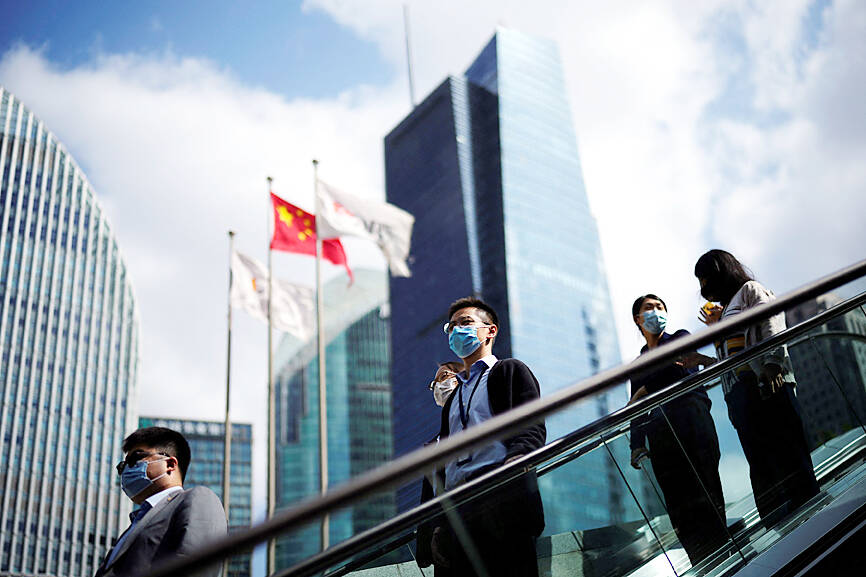Taiwanese financial holding firms’ exposure to China in the second quarter accounted for 7.92 percent of total overseas exposure, the lowest percentage in the 37 quarters since the Financial Supervisory Commission (FSC) began keeping records on overseas exposure.
The FSC has been compiling data on the overseas exposure of local financial holding firms since the second quarter of 2015.
Financial holding companies’ overall overseas exposure in the second quarter hit a record high of NT$28.02 trillion (US$853.83 billion), a 2.3 percent increase from NT$27.38 trillion in the first quarter, FSC data showed.

Photo: Reuters
Overall overseas exposure included NT$21.76 trillion in net investment, NT$4.43 trillion in net lending, and NT$1.83 trillion in deposits and interbank loans, with investments still constituting the largest portion of the local financial sector’s overseas exposure at 77.7 percent, the data showed.
Meanwhile, the top eight countries that domestic financial holding firms’ were most exposed to in the second quarter were the same as in the first quarter, with the US topping the list, followed by China, the UK, France, Australia, South Korea, Hong Kong and Japan.
Exposure to the US hit a record high in the second quarter, rising to NT$9.8 trillion, or 35 percent of total overseas exposure.
Substantial exposure to the US is not unique for Taiwan, as the US is a primary investment market for almost all countries, an FSC official said yesterday.
Meanwhile, financial holding firms’ exposure to China in the second quarter was NT$2.22 trillion, FSC data showed.
Although the figure increased slightly from the first quarter, overall overseas exposure increased, resulting in exposure to China making up 7.92 percent of total exposure.
The record low percentage indicated the local financial sector’s significant loss of interest in China, compared with the second quarter of 2015, when their exposure to China was 24.63 percent of the total, the official said.
Local financial holding firms’ exposure to China has been decreasing due to China’s economic slump, real-estate problems and debt crisis, and the Taiwanese government has been guiding them to spread their risk exposure, the official said.

AT RISK: The council reiterated that people should seriously consider the necessity of visiting China, after Beijing passed 22 guidelines to punish ‘die-hard’ separatists The Mainland Affairs Council (MAC) has since Jan. 1 last year received 65 petitions regarding Taiwanese who were interrogated or detained in China, MAC Minister Chiu Chui-cheng (邱垂正) said yesterday. Fifty-two either went missing or had their personal freedoms restricted, with some put in criminal detention, while 13 were interrogated and temporarily detained, he said in a radio interview. On June 21 last year, China announced 22 guidelines to punish “die-hard Taiwanese independence separatists,” allowing Chinese courts to try people in absentia. The guidelines are uncivilized and inhumane, allowing Beijing to seize assets and issue the death penalty, with no regard for potential

STILL COMMITTED: The US opposes any forced change to the ‘status quo’ in the Strait, but also does not seek conflict, US Secretary of State Marco Rubio said US President Donald Trump’s administration released US$5.3 billion in previously frozen foreign aid, including US$870 million in security exemptions for programs in Taiwan, a list of exemptions reviewed by Reuters showed. Trump ordered a 90-day pause on foreign aid shortly after taking office on Jan. 20, halting funding for everything from programs that fight starvation and deadly diseases to providing shelters for millions of displaced people across the globe. US Secretary of State Marco Rubio, who has said that all foreign assistance must align with Trump’s “America First” priorities, issued waivers late last month on military aid to Israel and Egypt, the

‘UNITED FRONT’ FRONTS: Barring contact with Huaqiao and Jinan universities is needed to stop China targeting Taiwanese students, the education minister said Taiwan has blacklisted two Chinese universities from conducting academic exchange programs in the nation after reports that the institutes are arms of Beijing’s United Front Work Department, Minister of Education Cheng Ying-yao (鄭英耀) said in an exclusive interview with the Chinese-language Liberty Times (the Taipei Times’ sister paper) published yesterday. China’s Huaqiao University in Xiamen and Quanzhou, as well as Jinan University in Guangzhou, which have 600 and 1,500 Taiwanese on their rolls respectively, are under direct control of the Chinese government’s political warfare branch, Cheng said, citing reports by national security officials. A comprehensive ban on Taiwanese institutions collaborating or

France’s nuclear-powered aircraft carrier and accompanying warships were in the Philippines yesterday after holding combat drills with Philippine forces in the disputed South China Sea in a show of firepower that would likely antagonize China. The Charles de Gaulle on Friday docked at Subic Bay, a former US naval base northwest of Manila, for a break after more than two months of deployment in the Indo-Pacific region. The French carrier engaged with security allies for contingency readiness and to promote regional security, including with Philippine forces, navy ships and fighter jets. They held anti-submarine warfare drills and aerial combat training on Friday in